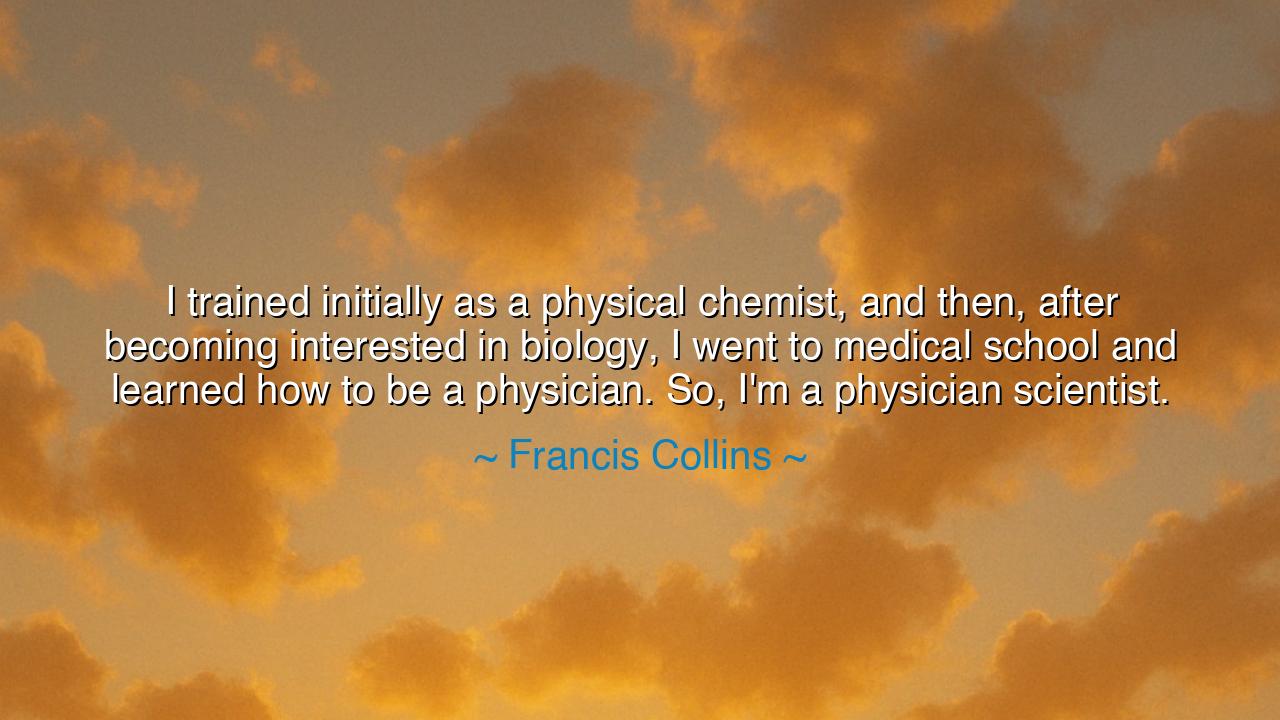
I trained initially as a physical chemist, and then, after
I trained initially as a physical chemist, and then, after becoming interested in biology, I went to medical school and learned how to be a physician. So, I'm a physician scientist.






In the words of Francis Collins, "I trained initially as a physical chemist, and then, after becoming interested in biology, I went to medical school and learned how to be a physician. So, I'm a physician scientist." This statement reflects the journey of an individual who sought to bridge the realms of science and medicine, recognizing that the pursuit of knowledge does not fit neatly into any one category, but requires the integration of multiple disciplines. Collins’s path from chemistry to medicine illustrates a deep curiosity and dedication to understanding the complexities of life itself, and it is this interdisciplinary approach that has allowed him to make profound contributions to the field of genomics and healthcare.
The ancients understood that true wisdom lies in the integration of diverse fields of knowledge. Plato, in his dialogue Phaedrus, spoke of the ideal philosopher-king, someone who not only understands the highest truths but has the practical wisdom to apply them to the world. Similarly, the ancient Greek physicians like Hippocrates sought to combine practical experience with theoretical knowledge, believing that healing required a balance of scientific understanding and compassion. Just as Hippocrates sought to unify the theoretical and the practical, Collins has shown us the importance of combining chemistry, biology, and medicine in the pursuit of better health and understanding of the human body.
In the case of Galen, the Roman physician, we find a figure who, much like Collins, was driven by an insatiable curiosity to understand the human body. Galen was both a physician and a scientist, and his contributions to anatomy and physiology laid the foundation for medical knowledge for centuries. His approach was characterized by rigorous observation and an unwavering desire to connect different areas of knowledge. In a similar way, Collins took an interdisciplinary approach to medicine—not just as a clinician, but as a scientist, deeply involved in understanding the biological mechanisms that underlie disease and health. Like Galen, Collins saw the need to combine theoretical understanding with practical care in order to make meaningful advances in medical science.
The journey of Isaac Newton, the great English physicist and mathematician, offers another example of how blending different disciplines can lead to monumental discoveries. Newton, famous for his work in physics, also made groundbreaking contributions to optics and astronomy, merging his knowledge of mathematics and natural philosophy to understand the world. Collins’s integration of physical chemistry and medicine echoes this same idea—by combining the precise methodology of the natural sciences with the human-centered focus of medicine, Collins has brought innovative thinking to the field of genetics and biomedical research.
The lesson from Collins’s career is that true innovation and understanding often arise from the willingness to cross boundaries between different fields. It is not enough to become an expert in just one area; to make a truly transformative impact, we must be open to integrating diverse knowledge systems. Collins has not confined himself to one path—he has embraced both the scientific and clinical aspects of human health, seeing them not as separate entities but as complementary parts of a larger whole. In doing so, he has advanced medicine in ways that were not possible through a more traditional, isolated approach.
In our own lives, we can take Collins’s example to heart by being curious and open-minded in our pursuit of knowledge. Whether in our careers, personal lives, or creative endeavors, we must strive to combine diverse areas of expertise and experience. Like Collins, we should not be limited by conventional boundaries, but instead seek to unite different disciplines to solve complex problems and enrich our understanding of the world. Whether we are artists, scientists, businesspeople, or educators, we can all benefit from integrating multiple perspectives to make meaningful progress.
Let us remember that true knowledge is not confined to any one field or discipline. By embracing a holistic approach to learning and understanding, we can contribute more fully to our communities and our world. Collins’s life shows us that the pursuit of knowledge should not be constrained by labels or traditional paths. Like the great thinkers of the past—whether Hippocrates, Galen, or Newton—we must follow our curiosity, build on what we know, and strive to unite science with humanity in order to create lasting change. True wisdom, after all, lies in the integration of learning across disciplines, for it is through such unity that we find the power to transform our world.






AAdministratorAdministrator
Welcome, honored guests. Please leave a comment, we will respond soon